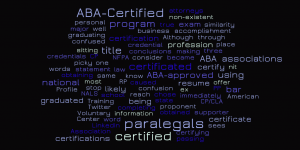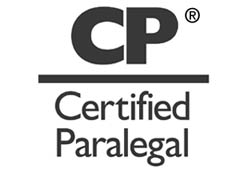 No. You are not an ABA-Certified Paralegal. Even if you graduated from an ABA-approved paralegal program and have “ABA-Certified Paralegal” plastered all over your resume and LinkedIn Profile, you are in fact NOT an ABA-Certified Paralegal because there is no such thing.
No. You are not an ABA-Certified Paralegal. Even if you graduated from an ABA-approved paralegal program and have “ABA-Certified Paralegal” plastered all over your resume and LinkedIn Profile, you are in fact NOT an ABA-Certified Paralegal because there is no such thing.
If you follow me on Twitter, you have heard me express my frustration over paralegals using the title “ABA-Certified.” I am a big proponent of paralegals obtaining certifications through state bar associations and the major national paralegal associations. If the American Bar Association chose to certify paralegals I would most likely be a supporter of that as well; however, the ABA does not certify paralegals.
I do not believe the paralegals using this non-existent credential are being intentionally deceitful. I think they are just confused. The confusion is caused by the similarity of the words “certified” and “certificated.” Let me explain and hopefully clear up this misunderstanding. I will use myself as an example.
In 1992, I graduated from the National Center for Paralegal Training, an ABA-approved program. I obtained a certificate by completing the program and became a certificated paralegal.
In 2010, I sat for the CLA/CP exam offered by the National Association for Legal Assistants (NALA). I passed the exam and earned the credential of Certified Paralegal. There are other national paralegal associations such as NFPA and NALS that also offer certifications. I have written a separate article on various paralegal credentials.
I am not trying to come down on paralegals using this title. I am writing to help them out. Using the title could really hurt a paralegal’s reputation and her job search. When a potential employer sees “ABA-Certified Paralegal” on a resume, she is likely to reach one of three conclusions: 1) The paralegal is being dishonest by claiming to be certified by the ABA; 2) This paralegal does not know enough about her own profession to understand the difference between holding a certificate and being certified; or 3) She does not pay enough attention to detail to see that “certified” and “certificated” are not the same word. These all reflect poorly on the paralegal and the profession.
Although attorneys may not be familiar with all it takes to become a CP, RP, or PP, they are familiar with the ABA and know that it is not in the business of certifying paralegals.
You may think drawing a strong distinction between being certificated and certified is being nit picky; it is not. It is quite similar to the difference between graduating from law school and passing the bar exam.
If you are currently using the title of ABA-Certified Paralegal I would stop immediately. Make the necessary changes to your resume and various profiles. If you completed a paralegal program that was ABA-approved, place that information following the school’s name.
Lastly, if you have erroneously used a the title of “certified”, consider making it a true statement by sitting for a paralegal certification exam. Voluntary certification pre-qualifies you in the eyes of many employers; it is a worthy investment in your career; and it is a fantastic personal accomplishment.
 Misty L. Sheffield is a freelance paralegal helping solos and small law firms in civil litigation. She has been assisting attorneys for over 12 years.
Misty L. Sheffield is a freelance paralegal helping solos and small law firms in civil litigation. She has been assisting attorneys for over 12 years. 



I agree completely with this post, other than one item. Sadly, some employers are not as well-educated about certifications as they should be. Some see “ABA” on a resume and fail to investigate any further. Hopefully, more articles and posts such as this one will make their way into bar journals and other professional publications.
You make a good point Joni. I hope awareness will increase as well.
I echo Joni’s response with some additional info….many employer’s are also not well educated as to what the ABA does and does not certify. I see job ad after job ad where it reads ABA Certified Paralegal wanted or “must be ABA certified” rather than saying “must have graduated/completed an ABA approved paralegal program”
Hi Caroline, Hopefully employers will become more paralegal credential savvy. I have written several articles on the topic and others have as well. Since the paralegal profession has wide variety of educational options and credentialing options, it can become confusing to employers.
Good quick article on this issue. I wrote an article on this subject for NALA’s “Facts & Findings” and a derivative of that article specifically directed to attorneys. You can find the article directed to attorneys here at:http://www.esrba.com/userfiles/october__2011_summation.pdf (starts on pg. 9). If someone comes across this and wants to reprint my article in another publication, please contact me via LinkedIn http://www.linkedin.com/in/elonajouben.
Hi Elona, Thank you for sharing your article on this subject.
Fabulous article Misty, thank you. After reading it, I had to pull up my resume and bio just to make sure I had not misstated my qualifications; I might have to make a slight adjustment to the text just to be clear. It currently reads: “graduated from … Southwestern Paralegal Institute in Houston – one of the first ABA approved paralegal certification programs in the US – as a certified paralegal in 1983 …”. Then again, in the dark ages, that was considered ‘certification’; there were no paralegal certification exams.
Hi Pamela,
The paralegal profession has gone through quite an evolution since 1983. I am glad we have the ability to earn certifications if we choose to do so. Congratulations on being pioneer of certificated paralegals!
I agree with Misty and Elona. This topic has been confusing paralegals for quite some time. Thank you for the clarification and your article.
Excellent point to bring attention to. I find that many employers are not educated at all regarding paralegals much less any type of certification. I try to educate those I come in contact with regarding paralegals, their training, etc. but it seems there is still a lot of confusion out there because there are still many out there with no training or experience whatsoever that call themselves paralegals. I appreciate you bringing this issue up!
Thank you Carol.Keep up the good work. Talking and writing about this common confusion in our profession is the best way to clear it up.
Misty, is a Registered Paralegal a step up from certified? Do employers recognize Registered Paralegals or just certified? I am getting ready to take the PACE test, and I wasn’t sure if that was going overboard.
Hi Catherine, That is a great question. The large variety of credentials in our profession can be overwhelming. Here is a link to a post I wrote about the various paralegal credentials that should help. Employers do recognize Registered Paralegals. I wish you the best of luck with the PACE exam!
Great article! I agree there are attorneys out there who are either misinformed or uninformed, which is sad considering how long the paralegal profession has been around. Some attorneys don’t know the distinctions among the paralegal titles, what is actually required of paralegals in California, the different types of paralegal education out there, or even how to best utilize a paralegal. When I see job postings asking for “certified paralegal,” or “paralegal with certificate,” etc., I’d wonder how to respond without sounding demeaning to state “I am well-qualified for the postion as in addition to my wealth of experience, I have a Bachelor of Science-Paralegal degree, an ABA approved PROGRAM–No certification, certificate required.”
Denise, Job postings are an excellent example of the confusion about certification. Thank you for the comment!
[…] graduated from paralegal school in May 1992 which makes this the 20th anniversary of my paralegal certificate. Happy Anniversary to me! Well, time flies and things changes. Take a stroll down paralegal […]